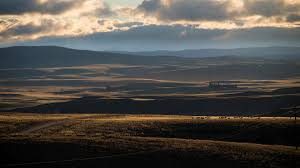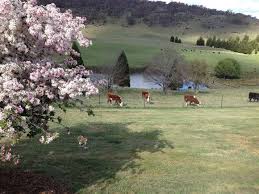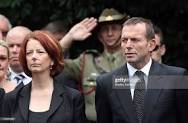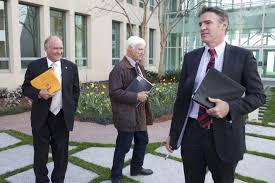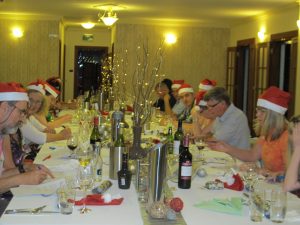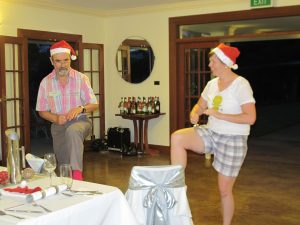Note: I have never kept a personal, narrative diary. But I have quite often written about personal matters; usually about sporting endeavour and, until now, just for the family. I have come across this ‘Match report’ and am re-producing it here mainly because, quite unexpectedly, it records the time and manner of my Parkinson’s diagnosis. The other reason for publishing it is to see if a critical mass can be found (Phoebe plus at least two others) for me to begin the practice of publishing more of my match reports to a wider audience than four children and their mother – two of whom are not the slightest bit interested in cricket or hockey anyway.
Match reports
September to November 2008
There’s something about celebrating changes in the seasons that appeals to me. Some of you may recall that in the past I have occasionally written special messages relating to work and/or play to coincide with the equinoxes and solstices.
Thus it was that on 1 September 2008, the first day of spring, I thought I would write a reflective piece for family and friends. Having recently been to both my GP and an osteopath complaining of general stiffness in the trunk and shoulders, I remember thinking on my walk that day that the piece might be about how important it is to be mobile. One sees so many people in the shopping mall or on the street with troubled gaits: knees or hips that clearly don’t work properly. My stiffness was nothing to complain about, being attributed by me to a pursuit — hockey — which almost by definition attests to one’s continued mobility. However I do remember that morning thinking how much elasticity, spring and bounce had been lost from my stride. The bigger problem on my walks, however, was still the psychological effect of even slightly heavy breathing, never mind real hyperventilation.
One sees so many people in the shopping mall or on the street with troubled gaits: knees or hips that clearly don’t work properly. My stiffness was nothing to complain about, being attributed by me to a pursuit — hockey — which almost by definition attests to one’s continued mobility. However I do remember that morning thinking how much elasticity, spring and bounce had been lost from my stride. The bigger problem on my walks, however, was still the psychological effect of even slightly heavy breathing, never mind real hyperventilation.
It was this psychological issue that took me to see my GP and friend Andrew. During that visit, almost as an afterthought, I had demonstrated to him the tremor in my right hand. Andrew’s response had been almost comic: “You’re putting that on!” On being assured that I was not, he recommended a visit to a specialist on Wednesday 3 September to rule out, as Andrew kindly put it, Parkinson’s.
The fact that he ruled it in, and the manner in which he did it, became part of our collective family lore. I didn’t even notice that he apparently dyed his hair red; but it was Alpha’s chief objection to his practice.
Alpha and I were both a bit surprised by the diagnosis – never mind the hair – and failed to ask many of the questions which subsequently occurred to us about this new situation. Some of those questions were clarified at our second visit when, with little modesty, he informed us that his research had been partly instrumental in categorising the tremors associated with Parkinson’s.
[The NRHA’s] CouncilFest started two weeks later and there must have been some hockey in between but nothing of the results is recorded in my diary or clearly in my memory. Suffice it to say that we finished about seventh out of 11 in fifth grade and were given a lifeline to a medal by being invited to play off for sixth grade. [Presumably the teams that finished 1-4 played off in 5th grade finals, with those that finished 5-8 being given an extra week’s hockey by playing off for 6th grade medals?] However it was not to be and our narrow loss was followed by the usual swearing of good faith to each other in the bar for yet another season next year.
After CouncilFest there was one free Saturday and then another before, all too soon, the cricket season began on 11 October. I am not sure if it is an omen of things to come but I will confess to having utilised Google maps to find out the precise location of Taylor Park in Queanbeyan – Leanne’s cheery hello on the phone via James that it was “the one near Macca’s” having been insufficient for me to fix it in my mind.
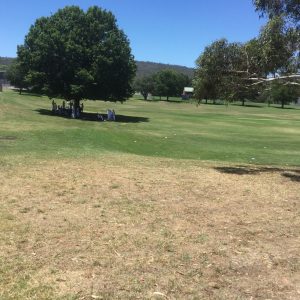
Once there I realised that it is the pitch where I umpired at one of the very few championship victories with which I have been associated. I was coach of Tadryn’s team and we won the final there. And just on the other side of the road is the tiny little soccer field where I also did some parenting and ball watching, on a pitch which is so miniature that it suggests the age group of the players at that time must have been less than double figures.
Leigh was at the cricket, and Pat our captain, and Josh, and the brothers Stott. And there at last was Lindsay, resplendent and immaculate as ever, and once he hove into view the cricket season had really begun. Pat won the toss and elected to bat: we only had about seven there and in any case it was very hot. We seem to have been in this position before. And, as on previous occasions, our number was boosted by somebody’s son and somebody’s nephew and somebody’s uncle and a friend of somebody’s niece.
We were playing ANU so it was clearly going to be a Gentlemen versus Players sort of affair, with ANU all cerebral, refined and studied, and Queanbeyan sixth grade more mud and muscle. I umpired for a bit. Josh flailed and failed, and Lindsay was given out lbw from the other end.

Nothing can attest more clearly to how deeply ingrained cricket is in my psyche than the fact, the real fact, that a significant portion of my nightmares over many years have been related to being caught unprepared for an innings: not having enough time to put the pads on, to find the box and place it, to tuck the trousers into the long socks, find a bat, put on the gloves. In my dream it becomes a sort of hopeless rush of unpreparedness, a losing battle against time which, nevertheless, never culminates in anything as bad as being given ‘timed out’.
I went in at five or six, nervous enough but quite prepared, and joined Leigh. He smashed the ball all over Taylor Park — 10 sixes — and made exactly 100 before being dismissed next ball. {Postscript: Paul, who was scoring, swears that one of his own singles was recorded inadvertently as Leigh’s but has agreed that it would be entirely inappropriate to divulge this to Leigh today – but perhaps some time during the end of season club dinner?} Of the 70 or 80 that Leigh and I put on, mine was a sedate 20.
We were lucky that when it came time for us to take the field a fine cloud was spread over the sky, sparing us from the worst of the early spring’s heat. We were also lucky that the ANU team, cerebral or not, proved inept and/or unlucky in the batting department. Josh was too quick, Pat too accurate and Leigh, on top of his batting, also could not be denied in the wickets department.
For a while it looked as though the exception would be one of their opening batsman, who had a whippy swing of the bat which reminded me of a good golf driver, with which he dispatched the ball a couple of times over the boundary at mid-wicket. When it came my turn to bowl I was rather hoping to bowl at the other batsman and for a while my luck held. However at the beginning of my second over the dasher was facing: but once again Lindsay and I proved that, together, we were up to the task. I pointed to the orange boundary cone at mid-wicket and invited Lindsay to station himself close to it. The first ball (can you believe that I can really remember such trivial things!) was on a good length but very wide of his leg stump. The second ball was right in the slot and he whipped it towards said cone and fielder, with the ball never rising above 5 feet from the ground. Lindsay trundled in and fell forward as if he had been pole-axed to take the catch – and for 10 days thereafter was showing off his broken hand to anybody who would look and listen. It was, he feared, “broken in several places” but made a miraculous recovery in time for the next game. At Taylor Park that day we made 166 and bowled ANU out for about 60.
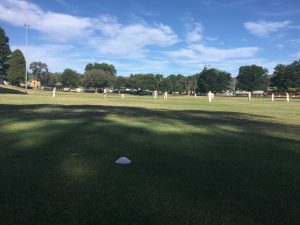
The next match was special for me from the beginning, because Tadryn was in town and we were almost certainly going to be short: have we ever not been? Pella was with him and also cousin Alyssa from Regina. This of course made it a real family day so Alpha also came to a place in the Tuggeranong area whose name I forget. Mic – making his debut for the year – and Lindsay – earning a quid on Saturday morning – were both late so Pat asked me to pad up and prepare to be ‘first drop’. Tadryn was accorded even greater respect, being asked to open the batting with Nic Stott. I was very proud watching him lunge forward with exaggerated care and less proud than anxious when he tried a couple of generous drives. He always used to get out, even when set, with a generous drive, either hitting it in the air or simply not hitting it at all.
Mic arrived with Tadryn and Nic still at the crease and after some reintroductions Mic was invited by Pat to pad up and go in next. Generous and understanding as ever, Mic demurred, suggesting that if Gordon were still to go in next he might have the chance to bat with Tadryn. Which is what happened. Nic hit a lofted drive to long on where one of the few in the fielding side who seemed equipped with considerable athleticism duly took the catch.
It was a great thrill for me to be in the middle with Tadryn and to have mother, sister and cousin all in a position to observe if not entirely to understand. The bowling was only moderately tidy and Tadryn drove, carved and clipped his way to 46 before being bowled off the outside edge and possibly his pad. So then I was able to bat with Mic. Pat gave me out lbw, possibly to make way for someone whose approach to scoring was more aggressive, and it was Nic, I think, who gave Mic out in the same fashion, with the batsman wandering forward 2 or 3 yards but still not complaining about the decision. Our total was 180 odd.
Everything went right when we bowled and fielded, with all catches held and no batsman getting on top of us. The undoubted highlight of the day — possibly of the year – – I observed from cover point. The batsman hit a top edge a huge distance in the air with the ball destined to come back to earth somewhere between our wicketkeeper, our square leg and Lindsay (who else) at fine leg. Having a good view of proceedings and plenty of time, I did briefly consider calling from cover point about whose catch it should be, but being confused perhaps by the numerous possibilities, failed to say anything at all. The wicketkeeper, the square leg and Lindsay made gentle progress towards each other, gingerly eyeing the towering trajectory carved by the small red object. Lindsay then called out, with rather a sense of resigned duty more than intended triumph: “Oh I’ll have a go at it!” Tadryn, who was at mid-on and had a different view of the affair, swears that Lindsay’s feet, arms and head made distinctly differential progress towards the ball. The feet were the first to call a halt; the hands second and the head third — with the result that Lindsay toppled gently forward like a drawbridge, failing to trouble the ball’s progress – although he himself claimed to have just got a finger onto it.
The tenor and content of Lindsay’s call, not the drawbridge effect, saw Tadryn and me chuckling hopelessly for the remainder of the over, during which the ball fortunately did not come in our direction.
Everyone who bowled had impressive statistics: Mic 2 for 8, I think, and Paul 3 for 7. The end was dignified for us by the sight of Mic’s brother-in-law, Lawrence, from America, at extra cover (in a borrowed white shirt) making a brave if involuntary stop with his chest or neck.
So again we had won by 100 runs or so. It had been a real family occasion. As well as Alpha, Pella and Alyssa there was Gill, my goddaughter; Leanne, my long-term colleague; Lawrence and Mic’s sister – who was carrying not only a child but, more visibly, a small dog who looked very much like Jambo. Little or no thought had been given to matters of gait and mobility, except of course when reflecting on Lindsay’s catch.
ends
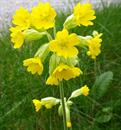
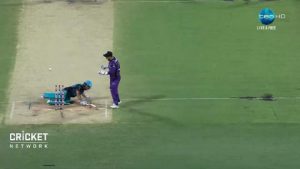
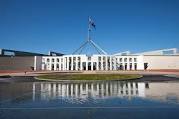

 pic from the Australian
pic from the Australian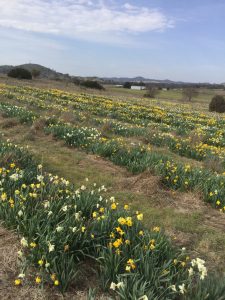
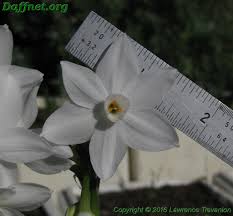


 "Most of the groups – most frequently referred to as sections – are fairly obvious, for example the Trumpet daffodils, the Tazettas, the Pheasant's eyes, the Hoop Petticoats, the Jonquils, and so on, and these are the basic divisions in the genus recognised here."
"An additional complication to the taxonomy is posed by hybridisation. Most species of Narcissus will hybridise but, significantly, there is great variation in the fertility of the offspring, depending upon the degree of relationship between the parents. - - There has been a great deal of hybridisation in this very popular, garden-worthy genus, resulting in thousands of hybrid cultivars and selections (Kington, 1998), and doubtless this will continue. Although much of this work has been concerned with sophisticated selection for flower form and colour (e.g., pink and red coronas and apricot-coloured perianth segments), there are probably still some interesting lines of research that could be pursued using the many wild species. Taking just one possibility as an example, the autumn-flowering species (Narcissus serotinus, N. elegans and the green-flowered N. viridiflorus) could perhaps be utilised in the production of a race of larger-flowered autumnal narcissi, thus extending the overall flowering season of the garden forms by several months. With the great diversity of characters exhibited by the species and their numerous variants, there are great possibilities in this natural gene pool. However, some of the species are under threat in the wild, and many more will become so with increasing urban and tourist-based development."
[From the chapter by Brian Mathew, in Narcissus and Daffodil - The genus Narcissus, edited by Gordon R. Hanks, Horticulture Research International, Kirton, UK, Taylor & Francis e-library, 2005.]
"Most of the groups – most frequently referred to as sections – are fairly obvious, for example the Trumpet daffodils, the Tazettas, the Pheasant's eyes, the Hoop Petticoats, the Jonquils, and so on, and these are the basic divisions in the genus recognised here."
"An additional complication to the taxonomy is posed by hybridisation. Most species of Narcissus will hybridise but, significantly, there is great variation in the fertility of the offspring, depending upon the degree of relationship between the parents. - - There has been a great deal of hybridisation in this very popular, garden-worthy genus, resulting in thousands of hybrid cultivars and selections (Kington, 1998), and doubtless this will continue. Although much of this work has been concerned with sophisticated selection for flower form and colour (e.g., pink and red coronas and apricot-coloured perianth segments), there are probably still some interesting lines of research that could be pursued using the many wild species. Taking just one possibility as an example, the autumn-flowering species (Narcissus serotinus, N. elegans and the green-flowered N. viridiflorus) could perhaps be utilised in the production of a race of larger-flowered autumnal narcissi, thus extending the overall flowering season of the garden forms by several months. With the great diversity of characters exhibited by the species and their numerous variants, there are great possibilities in this natural gene pool. However, some of the species are under threat in the wild, and many more will become so with increasing urban and tourist-based development."
[From the chapter by Brian Mathew, in Narcissus and Daffodil - The genus Narcissus, edited by Gordon R. Hanks, Horticulture Research International, Kirton, UK, Taylor & Francis e-library, 2005.]

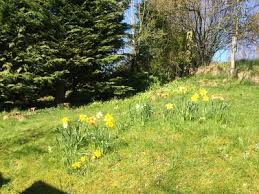
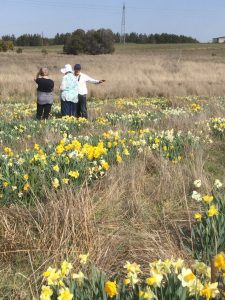

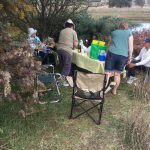
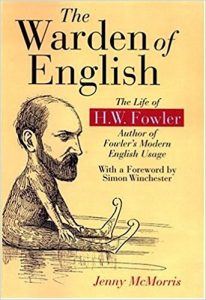
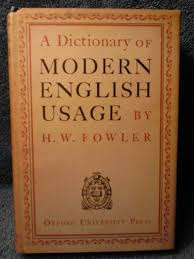

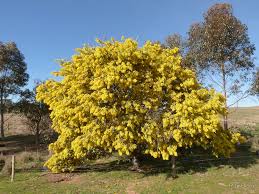 Beautiful weed
Beautiful weed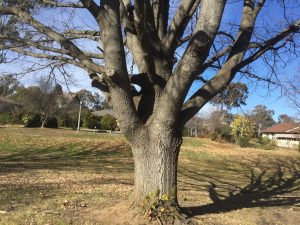
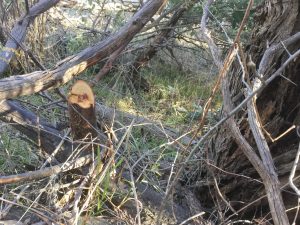
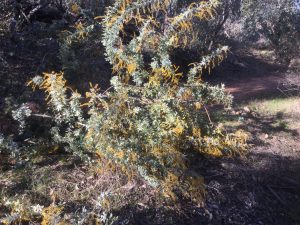
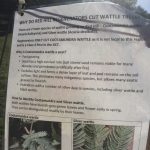
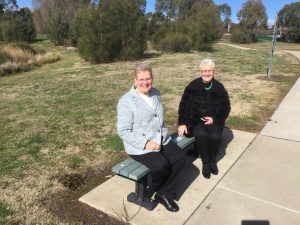
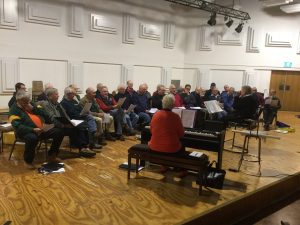 She's danced on the ivories since she was eight
She can finger just all of the keys
And though you don't know it, she played cello too -
- Just a keyboard between both her knees.
She came to Australia forty-six years ago
For a while she needed to roam;
In Sydney, Port Stephens and then Central West
With Lesley she made a warm home.
She served in her towns for political reps
In the community and in the pews
Les always behind her to get them the papers
- In those days there wasn't 'Fake News'.
Her church and her music are precious to Bev
And in Orange from nineteen-eight-nine
The Rowland Gregory Orpheus Singers
Took much of their after-work time.
She's danced on the ivories since she was eight
She can finger just all of the keys
And though you don't know it, she played cello too -
- Just a keyboard between both her knees.
She came to Australia forty-six years ago
For a while she needed to roam;
In Sydney, Port Stephens and then Central West
With Lesley she made a warm home.
She served in her towns for political reps
In the community and in the pews
Les always behind her to get them the papers
- In those days there wasn't 'Fake News'.
Her church and her music are precious to Bev
And in Orange from nineteen-eight-nine
The Rowland Gregory Orpheus Singers
Took much of their after-work time.
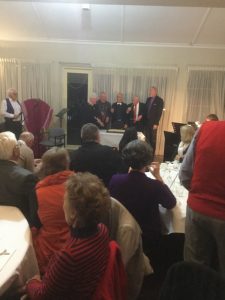 Bev was accompanist, Les in the choir,
Together a close double act.
Her favourite key was always G Flat
For in that mode it's mostly All Blacks.
Apart from her partner there's one other man
For whom Bev has always been true
In tune with each other, from bar to bar,
And Leon, you know that it's you.
Alpha met Bev at the Sydney Town Hall
- The memory both of them chat-on
The men tried to speed up But Bev remained geed-up
She said "It's like cricket: When you're at the wicket
Keep your eyes on your leader She'll declare when she needs-ta;
In the meantime please all watch her baton."
Alpha and Bev became very firm friends
Similar women with similar ends -
Though Sasha and Toby, you all will agree
Were closer companions than Alpha could be!
Alpha has written in elegant prose
Of the Beverley Glover that each of us knows.
She has energy, patience, she's keen to do more
In musical matters she knows the full score.
Her large congregation of this is apprised:
On Sundays she'll keep her church well organ-ised.
Her laugh is infectious, she's full of kind tricks
And only in silence when watching Netflix.
Bev was accompanist, Les in the choir,
Together a close double act.
Her favourite key was always G Flat
For in that mode it's mostly All Blacks.
Apart from her partner there's one other man
For whom Bev has always been true
In tune with each other, from bar to bar,
And Leon, you know that it's you.
Alpha met Bev at the Sydney Town Hall
- The memory both of them chat-on
The men tried to speed up But Bev remained geed-up
She said "It's like cricket: When you're at the wicket
Keep your eyes on your leader She'll declare when she needs-ta;
In the meantime please all watch her baton."
Alpha and Bev became very firm friends
Similar women with similar ends -
Though Sasha and Toby, you all will agree
Were closer companions than Alpha could be!
Alpha has written in elegant prose
Of the Beverley Glover that each of us knows.
She has energy, patience, she's keen to do more
In musical matters she knows the full score.
Her large congregation of this is apprised:
On Sundays she'll keep her church well organ-ised.
Her laugh is infectious, she's full of kind tricks
And only in silence when watching Netflix.
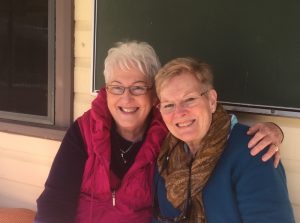 We will share her on Facebook, we will see her on Skype,
And her legacy's plain, she is one of a type.
Let us pick up her mantle, let us go where she's led
Our thanks not piano but forte instead!
For Bev's contributions will always inspire
After thirty-odd years with the Male Voice Choir.
12 May 2017
We will share her on Facebook, we will see her on Skype,
And her legacy's plain, she is one of a type.
Let us pick up her mantle, let us go where she's led
Our thanks not piano but forte instead!
For Bev's contributions will always inspire
After thirty-odd years with the Male Voice Choir.
12 May 2017
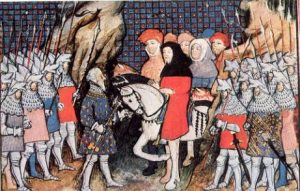
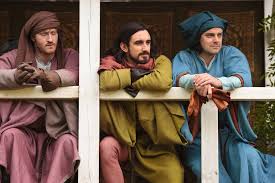
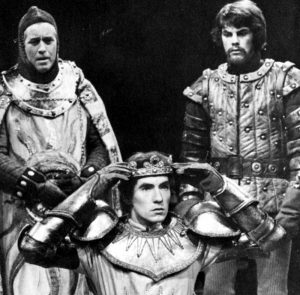
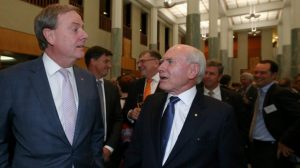


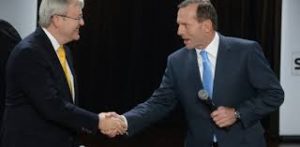




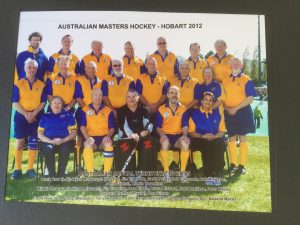 Tony is seated, second from Left
Tony is seated, second from Left
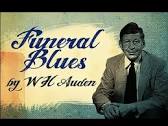
 – and in the musical February House, produced Off-Broadway in 2012, a large portion of the poem is sung by Auden himself. I find it very moving.
– and in the musical February House, produced Off-Broadway in 2012, a large portion of the poem is sung by Auden himself. I find it very moving. Heart of our Universe
Heart of our Universe